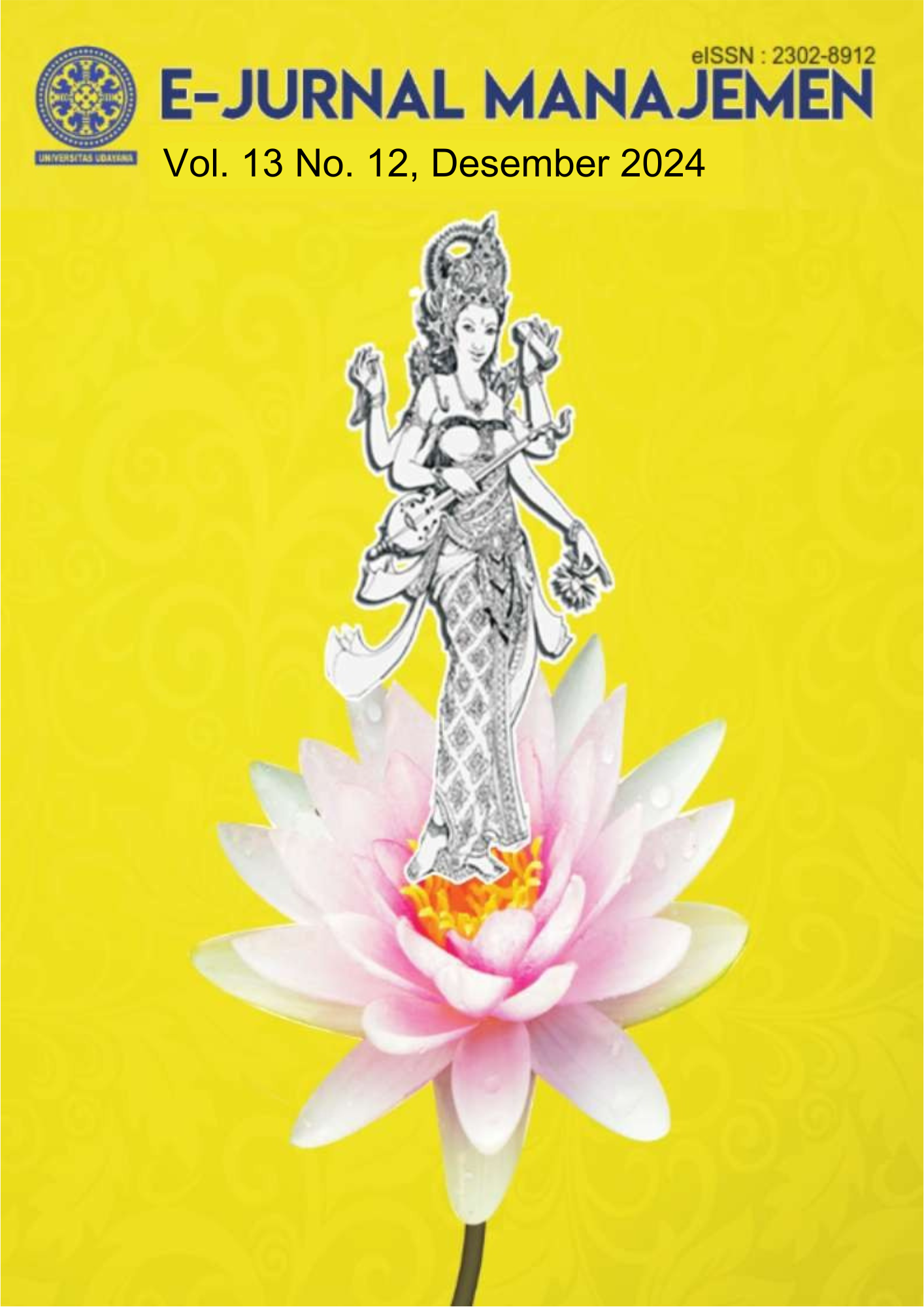PREFERENSI UKM DALAM MEMASUKI PASAR INTERNASIONAL: BAGAIMANA UKM MEMUTUSKAN?
Abstract
Globalisasi dan meningkatnya persaingan pasar internasional mendorong UKM untuk menjajaki peluang ekspor. Penelitian ini mengkaji preferensi pengusaha UKM berorientasi ekspor dalam memutuskan untuk memasuki pasar internasional, dengan fokus pada atribut-atribut utama pengambilan keputusan, kombinasinya, dan tingkat kepentingannya. Data dikumpulkan dari 35 UKM berorientasi ekspor di Kota Batu dengan menggunakan metode sampling jenuh, dan teknik analisis data yang diterapkan adalah analisis konjoin (conjoint analysis) untuk mengevaluasi atribut-atribut yang mendasari keputusan internasionalisasi UKM di kota Batu. Hasil penelitian menunjukkan bahwa potensi pasar, jaringan bisnis, kemudahan masuk pasar, dukungan pemerintah, dan platform e-commerce internasional secara signifikan memengaruhi pengambilan keputusan. Di antara semua itu, nilai preferensi tertinggi dikaitkan dengan potensi keuntungan besar, kemitraan dengan jaringan bisnis, kontrak kerja sama yang jelas, program pelatihan rutin, dan adopsi teknologi digital. Penelitian ini menyimpulkan bahwa pengusaha UKM memprioritaskan manfaat ekonomi dan operasional, seperti keuntungan dan kemitraan, daripada dukungan finansial atau kelembagaan. Temuan-temuan ini menggarisbawahi perlunya kebijakan yang meningkatkan kolaborasi, memberikan pelatihan berkelanjutan, dan mempromosikan adopsi teknologi untuk mendukung daya saing UKM di pasar internasional. Penelitian ini memberikan kontribusi untuk memahami internasionalisasi UKM dan menawarkan wawasan praktis bagi para pembuat kebijakan dan praktisi untuk memperkuat kehadiran UKM dalam perdagangan global.
Globalization and increasing international market competition encourage SMEs to explore export opportunities. This study examines the preferences of export-oriented SME entrepreneurs in deciding to enter the international market, focusing on key decision-making attributes, their combinations, and their levels of importance. Data were collected from 35 export-oriented SMEs in Batu City using the total population sampling method, and the data analysis technique applied was conjoint analysis to evaluate the attributes underlying the internationalization decisions of SMEs in Batu City. The study findings indicate that market potential, business networks, ease of market entry, government support, and international e-commerce platforms significantly influence decision-making. Among them, the highest preference values are associated with large profit potential, partnerships with business networks, clear cooperation contracts, regular training programs, and adoption of digital technology. The study concludes that SME entrepreneurs prioritize economic and operational benefits, such as profits and partnerships, over financial or institutional support. These findings underscore the need for policies that enhance collaboration, provide continuous training, and promote technology adoption to support SME competitiveness in the international market. This study contributes to understanding SME internationalization and offers practical insights for policymakers and practitioners to strengthen SME presence in global trade.
Downloads
References
Amankwah-Amoah, J., Adomako, S., Danquah, J. K., Opoku, R. A., & Zahoor, N. (2022). Foreign market knowledge, entry mode choice and SME international performance in an emerging market. Journal of International Management, 28(4), 100955. https://doi.org/10.1016/j.intman.2022.100955
Cahyadi, I. (2015). Tantangan Internasionalisasi Ukm Di Indonesia Dalam Menghadapi Masyarakat Ekonomi Asean. Kajian, 20(02), 129–143. https://pure.ltu.se/
Chetty, S., Martín Martín, O., & Bai, W. (2024). Causal foreign market selection and effectual entry decision-making: The mediating role of collaboration to enhance international performance. Journal of Business Research, 172(August 2023), 114385. https://doi.org/10.1016/j.jbusres.2023.114385
Divrik, B. (2023). International Market Entry Strategies (pp. 1–10). https://doi.org/10.4018/978-1-6684-6613-1.ch001
Francioni, B., & Martín Martín, O. (2024). International market, network, and opportunity selection: A systematic review of empirical research, integrative framework, and comprehensive research agenda. Journal of International Management, 30(5), 101174. https://doi.org/10.1016/j.intman.2024.101174
Ghanad, A. (2023). An Overview of Quantitative Research Methods. International Journal of Multidisciplinary Research and Analysis, 06(08). https://doi.org/10.47191/ijmra/v6-i8-52
Handoyo, S., Yudianto, I., & Fitriyah, F. K. (2021). Critical success factors for the internationalisation of small–medium enterprises in indonesia. Cogent Business and Management, 8(1). https://doi.org/10.1080/23311975.2021.1923358
Heise, D. R. (2001). Scaling and Classification in Social Measurement (N. J. Smelser & P. B. B. T.-I. E. of the S. & B. S. Baltes (eds.); pp. 13504–13508). Pergamon. https://doi.org/https://doi.org/10.1016/B0-08-043076-7/00704-X
Kaukab, M. E. (2016). Internasionalisasi UMKM di Indonesia. Literature Review Dan Pengembangan Konsep, November 2016, 1–21. https://doi.org/10.13140/RG.2.2.21887.64163
Kolagar, M., Reim, W., Parida, V., & Sjödin, D. (2022). Digital servitization strategies for SME internationalization: the interplay between digital service maturity and ecosystem involvement. Journal of Service Management, 33(1), 143–162. https://doi.org/10.1108/JOSM-11-2020-0428
Krabbe, P. F. M. (2017). Choice Models. In P. F. M. B. T.-T. M. of H. and H. S. Krabbe (Ed.), The Measurement of Health and Health Status (pp. 197–225). Academic Press. https://doi.org/10.1016/b978-0-12-801504-9.00011-8
Lloyd-Reason, L., Ibeh, K., & Deprey, B. (2009). Top Barriers and Drivers to SME Internationalisation. Focus, 1–32. http://strathprints.strath.ac.uk/15845/
Louviere, J. J. (2001). Conjoint Analysis Applications (N. J. Smelser & P. B. B. T.-I. E. of the S. & B. S. Baltes (eds.); pp. 2565–2568). Pergamon. https://doi.org/https://doi.org/10.1016/B0-08-043076-7/00593-3
Michell, J. (2001). Measurement Theory: History and Philosophy (N. J. Smelser & P. B. B. T.-I. E. of the S. & B. S. Baltes (eds.); pp. 9451–9454). Pergamon. https://doi.org/https://doi.org/10.1016/B0-08-043076-7/00595-7
Ozturk, A., Joiner, E., & Cavusgil, S. T. (2015). Delineating foreign market potential: A tool for international market selection. Thunderbird International Business Review, 57(2), 119–141. https://doi.org/10.1002/tie.21686
Pajunen, N. (2021). Internationalization and market potential assessment in B2C contexts : A case study in the packaged consumer goods sector.
Qi, X., Chan, J. H., Hu, J., & Li, Y. (2020). Motivations for selecting cross-border e-commerce as a foreign market entry mode. Industrial Marketing Management, 89(November 2018), 50–60. https://doi.org/10.1016/j.indmarman.2020.01.009
Rahayu, R., & Day, J. (2017). E-commerce adoption by SMEs in developing countries: evidence from Indonesia. Eurasian Business Review, 7(1), 25–41. https://doi.org/10.1007/s40821-016-0044-6
Rahman, M., Hack-Polay, D., Shafique, S., & Igwe, P. (2024). Institutional and organizational capabilities as drivers of internationalisation: Evidence from emerging economy SMEs. International Journal of Entrepreneurship and Innovation, 25(3), 187–202. https://doi.org/10.1177/14657503221106181
Rosita, E., Hidayat, W., & Yuliani, W. (2021). Uji Validitas Dan Reliabilitas Kuesioner Perilaku Prososial. FOKUS (Kajian Bimbingan & Konseling Dalam Pendidikan), 4(4), 279. https://doi.org/10.22460/fokus.v4i4.7413
Sanyal, S., Hisam, M. W., & Baawain, A. M. S. (2020). Challenges facing internationalization of smes in emerging economies: A study on oecd model. Journal of Asian Finance, Economics and Business, 7(2), 281–289. https://doi.org/10.13106/jafeb.2020.vol7.no2.281
Singh, N., Munjal, S., & Kundu, S. K. (2023). Marketplace platforms as game changers: Internationalization of smaller enterprises. Journal of International Management, 29(4), 101035. https://doi.org/10.1016/j.intman.2023.101035
Utami, E. yuniarti, & Lesmana, T. (2023). Faktor-faktor yang Mempengaruhi Keputusan Perusahaan Kecil dan Menengah untuk Mengadopsi Strategi Go Global dalam Kewirausahaan di Indonesia. Jurnal Ekonomi Dan Kewirausahaan West Science, 1(04), 292–300. https://doi.org/10.58812/jekws.v1i04.710
Ward Thompson, C. (2013). Activity, exercise and the planning and design of outdoor spaces. Journal of Environmental Psychology, 34, 79–96. https://doi.org/https://doi.org/10.1016/j.jenvp.2013.01.003
Younis, H., & Elbanna, S. (2022). How Do SMEs Decide on International Market Entry? An Empirical Examination in the Middle East. Journal of International Management, 28(1), 100902. https://doi.org/10.1016/j.intman.2021.100902
Yuhua, B. Z. (2015). APEC Policy Support Unit SME Internationalization and Measurement. 12.





















